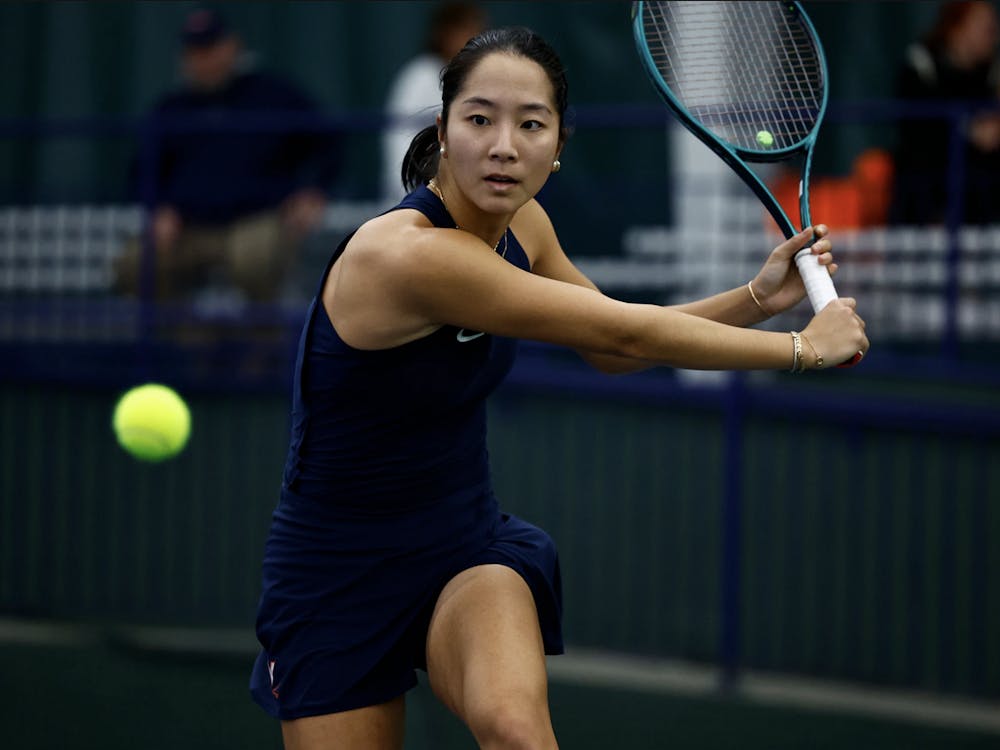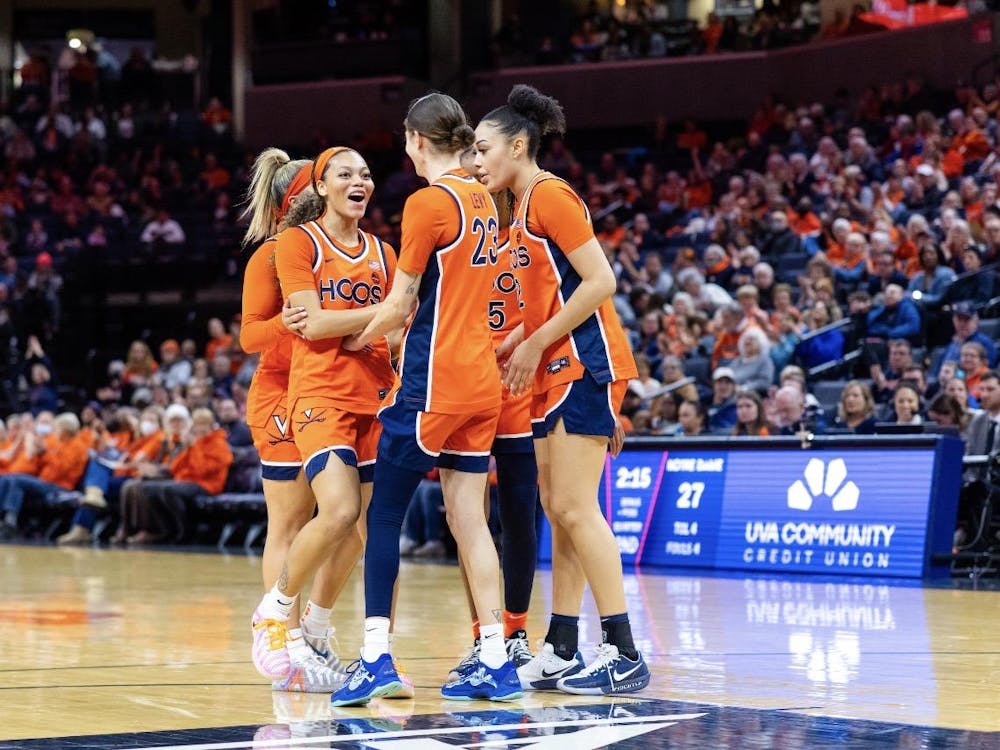At one of last fall's football games, the Virginia women's rowing team was honored at halftime. The Cavaliers had just won their ninth consecutive ACC Championship and placed fifth at the NCAA Championships, finishing in the top five for the eighth time in 11 years at the NCAAs.
I was covering the football team for The Cavalier Daily at the time. As I watched from the press box, a beat reporter sitting next to me asked a rather revealing question.
"So, Virginia has a rowing team?"
The rowing team is one of the best teams Virginia has to offer. Yet hardly anyone on Grounds cares and some don't even know that the women's crew team exists. When I asked the coaching staff how many fans attend home rowing events, novice coach Sarah Cannon quipped, "Well, there are two parents per rower, plus other family members, so you do the math."
For those of you who did not read the first part of this series, I spent two days practicing with the crew team. It was one of the more exhausting athletic experiences I've ever endured and it is one that Virginia rowers put themselves through six days a week for four years. Several sources told me that there are no harder workers in the athletics program than the women's rowers. I believe it. But there is no sport that gets less attention.
This brings up two questions. First, why do people stick with it for four years? Second, should the rowing team receive more coverage from The Cavalier Daily and other media outlets?
I spoke at length with coaches, current rowers and a former rower about these subjects. I'll discuss each in turn.
Sticking Around
I witnessed first-hand how physically, mentally and emotionally demanding it is to be a rower. Grueling workouts six days a week are taxing at the time and make everything in between more challenging. If you think it's tough pulling an all-nighter for an exam, how about when you're exhausted from doing six sets of 1,000 meters on the rowing machine? And when so much time is spent rowing, the all-nighters become more frequent.
I tried rowing for two days, and there's no chance I'm going back. But there are people like 2007 Virginia rowing alum Melanie Kok, who earned first-team All-American honors with the Cavaliers and went on to win a bronze medal at the 2008 Olympics in Beijing in the lightweight women's double sculls for Canada.
"I wouldn't have gotten through the practices that I did," she said, "if it weren't for the people around me."
You need camaraderie in every sport - but perhaps none more than rowing. If you don't trust your teammates to stroke at precisely the same rate as you, the team will not succeed. One rower can't take over a race. As senior Jenny Cromwell put it, "Our sport truly defines teamwork."
Part of this camaraderie is fairly intuitive - they're all in it together. When you're killing yourself on that last set of the erg, it sure helps to know that 40 other people are pushing themselves, too. And that camaraderie is supported and promoted by Virginia coach Kevin Sauer and his staff.
But that alone fails to explain why girls don't burn out more often because that type of chemistry should happen everywhere. The Virginia varsity team has five boats of eight - "I don't know if there's anybody in the country that has that many boats," Sauer said. And, he noted that retention is high relative to other schools.
One additional factor is the coaching staff, which knows when to back off and when to lighten up. If Sauer senses that the team is too burdened, he might surprise them with a day off. Once, the team even played soccer for one workout just to change things up.
"It's almost like they know exactly how far to push," junior rower Caroline Sweeny said, "and then to allow ourselves to keep pushing rather than them doing it."
It also helps, rowers said, that the program is simply exceptional.
"When they go fast and they have success, that tends to help in their assessment of, do they want to keep doing this?" Sauer said. "They're like, 'Yeah, I want to keep doing this, we could win the whole freakin' thing.'"
Is there some degree of burnout? Of course there is. Do rowers ever question whether it's worth it? Many do. They ask the same questions that I asked myself in just two practices. Take it from Cromwell.
"There's definitely those practices where you're like, 'Why am I doing this? What am I doing here? What is this gonna do?'" she said. "There's no professional rowing or anything. For me, it just gets back to the whole team aspect and knowing that we could win NCAAs and that we can get faster and that each practice, we get closer to that goal."
But still, there's a reason why only some people are rowers. Rowing requires a certain personality type that people like me will never understand. The kind that allowed Kelsie Chaudoin, a 2008 rowing graduate, to earn a GPA north of 3.0 in the Architecture School while minoring in Spanish. The kind of determination that will make me think twice before I ever complain about lacking time in my schedule.
And then there's the most dumbfounding part of it to me: When I asked senior Helen Tompkins why she rows, she said simply, "I like it."
That statement knocked me off my feet. But it is that shared enjoyment of the sport, too, that brings the rowing team ever closer together.
"The crew team at Virginia seems to have a pretty solid bond," Kok said. "If I met someone randomly on the street who came up to me and told me that they rowed at Virginia, I would immediately feel like I had this bond with them."\n\nUncovering the Uncovered
This past weekend, Virginia debuted its fall season as five boats raced at the Head of the Charles, an event featuring numerous 5,000-meter head races. It is the biggest head racing event in the world, and one of the oldest. Competing against collegiate and international competition, Virginia won three of the five events.
Was there a mention in the media, other than on the official Virginia athletics Web site? Nope. Nothing in this newspaper or elsewhere.
Are the rowers frustrated? You bet.
"It's almost to the point where we know that nothing's going to happen," Sweeny said. "So we don't expect anything."
I know what you're thinking. Rowing? Give me a break. Who likes rowing, anyway?
Even the rowers admit aspects of the sport make it difficult to follow. For starters, it's not much of a spectator sport. There are no exciting plays in rowing - no baskets, goals, winners or passes. Track and swimming are close relatives that also don't have such plays, but one can at least relate to those sports - most people have run or swam before, so it is possible to appreciate when someone is much faster than you are. Not so for rowing.
Plus, even if you do watch the race, you likely don't see much of it. Even the shortest races are 2,000 meters long - of that, you might catch a few hundred meters. Coaches often have to ride a bike next to the river just to keep up.
"The boat goes by for like 30 seconds or a minute, and that's it," Sweeny said.
But Sauer told me something that changed my mind a bit. When Virginia travels to races like the Head of the Charles, people flock to the water. Admittedly, they are not all there to see Virginia - most races feature numerous teams from across the country. But we're not talking about thousands of fans - try hundreds of thousands. Sauer said there are sometimes crowds of 300,000 or more at their races. One year, he did some math and figured out that there were more people in attendance at their races than at home football games.
So the question isn't so much why people don't care; it's why people don't care here.
And the rowers had some answers for that, too. Rowing is one of those sports that's rarely at home, and even then, the Rivanna River is not within walking distance. Cromwell also pointed out that the program has only existed since 1995, while some of the Ivy League schools' and others' have more of a tradition.
The media also is part of the problem. I have always been of the opinion that the media should report what the public considers newsworthy; rowing hardly seems that way. But Sauer's point is a good one: the public has spoken elsewhere. Perhaps if the University community was made aware of the rowing team and its success, the fan base here would grow, too.
"Chicken and egg, cart before the horse," Sauer said. "If you report on us, then maybe people will be interested in us. And maybe people will be like, 'Wow, those guys are good! Wow, they do some cool things!'"
I'm not saying, of course, that rowing should get the same coverage as the football team. Or the baseball team when it goes to the College World Series. Even Sauer admits that. But for a team that is as successful as any other here, in a sport that has proven popularity elsewhere, and for a group that is really quite remarkable, a little boost in coverage is in order.
"It's a big bummer to not see our team represented for our school, which is who we row for," Cromwell said. "I know I pick up a copy of The Cavalier Daily, so publicity - getting the word out there a little bit more - would really help."
Sauer is quick to note that while he and his team are frustrated by the lack of coverage, he's not sore about it: "No sour grapes," he said. Whether the cameras and the recorders are on them, they'll keep erging, lifting and rowing, day in and day out. They'll put in an absurd amount of work this week, so that, this weekend, they just might win the Princeton Chase.
Will they be successful at the Princeton Chase? Probably. Will anyone take notice? Probably not. But that doesn't matter to the rowers. They just keep on paddling.






